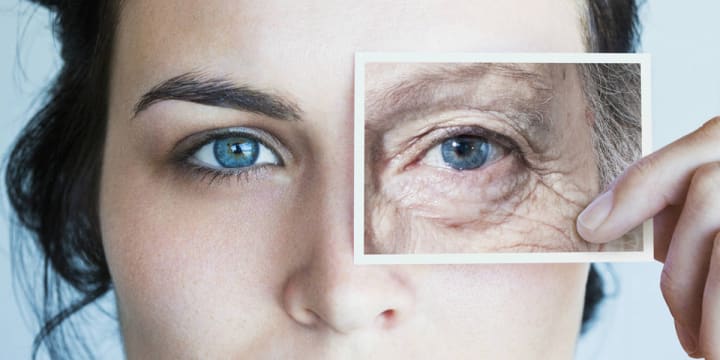How to Know...and Slow...How Fast You’re Aging
The single most effective age-retarder is you and what you do, and it is totally in your control.

Wе all have a personal aging pattern that has little to do with the calendar and everything to do with how well we cope with stress, how successful we are at relationships, and whether we approach life with an optimistic or defeatist attitude. In fact, the single most effective age-retarder is definitely within your control. It's you and what you do.
With an attitude change here, a lifestyle change there, you can actually take eight, maybe even 10 or more years off your biological age—right now. This discovery was the result of the first large-scale clinical study on human aging. It was conducted between 1981 and 1984 under the auspices of the Canadian Institute of Stress, founded by stress research pioneer Dr. Hans Selye, and involved 623 subjects—336 men and 287 women.
A condensed anti-aging program developed based on these preliminary findings and decades of further research can work as effectively for you as the original one did for those in the study. Ahead are two self-tests—one accurately measures your present body age; the other, a two-stage questionnaire, predicts the rate at which you're aging (faster or slower than the norm). With this vital information you can write your own anti-aging prescription and, better yet, see results (feel better, look younger) in as little as four months.
The Top Age-Fighters

Participants in the Body Age Study were monitored for their responses to a number of age-proofing tactics, including diet, exercise, and stress control. At the program start, the participants (most of them in their forties and fifties) tested biologically older than their calendar ages—many by 10 years or more. Each was then put on a health regime and retested four months later. Without exception, the group showed a marked decrease in body age. Eight months later, that decrease averaged 8.2 years. Participants not only looked younger, showing dramatic improvements in weight, skin tone, posture—even the number and depth of their facial wrinkles had faded.
Beyond this, the study turned up four more startling longevity findings:
- The “Decade of Vulnerability"Premature aging can happen to anyone at any stage of life, but it's most prevalent between the ages of forty and fifty. During this “decade of vulnerability," the average man ages 15.2 years; the average woman, 18.8. But this doesn't have to happen.
- The 10 Critical Longevity VitaminsThe single most effective way to slow aging is to eat the right foods, aided by a supplement containing the following anti-aging Vitamins: A, B, B2, B, C, E, folic acid, and biotin. These 10 vitamins were consistently low in those testing eight or more years older than their chronological ages in another earlier study. To see if they could actually lower body age, half of the participants were given a placebo; the others received a vitamin supplement formulated at the Institute. At the end of the eight months, those taking the supplement knocked off an additional two and a half years.
- The Mini-Exercise EffectSurprisingly, exercise proved to be the least effective body-age reducer—by itself, producing only modest benefits. In combination with diet, however, it's very powerful indeed.
- The Maxi-Stress Impact.By contrast, how well you handle stress determines to a large degree both the way and how quickly you'll age. Those in the study who didn't cope well with pressure complained more of fatigue, insomnia, minor aches and pains, and frequent short-term illnesses. Almost without exception, these symptoms disappeared by study end—doctor visits dropped by 53 percent and workdays missed due to illness dropped by 58 percent. Less stress also meant fewer wrinkles.
These findings have made it possible to provide the first-ever customized prescriptions or combating stress and aging. They are geared to your particular behavioral type, or "stressotype." The study identified six and revealed several effective anti-aging remedies. To find those that will work best for you, take a look at the questionnaire below.
Write Your Own Anti-Aging Prescription

Many people have one strongly dominant stressotype, while others score highly in two or more categories. To pinpoint the precise areas in your life that need changing, read the profile(s) that match your stressotype.
Cliff Walker
Cliff Walkers have a live-for-the-day attitude when it comes to their health. They may smoke and drink too much, exercise never or erratically, be overweight, and use tranquilizers and antacids frequently. In short, along with Speed Freaks, this type is the most likely candidate for a fatal heart attack in the thirties or forties.
Anti-Aging Prescription: You really have to take better care of yourself— fast. Right now you're an accident waiting to happen. However, with improved diet and exercise habits, you can reverse the vitality drain your present life-style is creating.
Basket Case
Basket Cases are in a state of chronic fatigue. These types are often tired even before the day begins. Consequently, they may rely on a number of stress enhancers—caffeine, nicotine, sugar—to rev up. Their diet tends to be poor and they're usually too exhausted to exercise. Lack of vitality makes Basket Cases older than their years.
Anti-Aging Prescription: You're suffering from lack of stimulation and need to add some well-chosen stressors to your life—for instance, regular physical exercise, a challenging hobby, maybe even a more stimulating job. And make your diet a number-one priority by slipping in more low-fat, high energy carbohydrates (fruits, vegetables, whole grains) and taking multivitamin/mineral supplements.
Drifter
There are two main types of Drifters. The more obvious is the person who never seems to find a goal or direction in life, and consequently drifts from job to job, relationship to relationship, and so on. Equally common: the person prone to mid-life crisis. These are often successful people who question their goals and the sacrifices they've made to achieve them. This psychic unrest can manifest as fatigue, insomnia, depression, and minor illnesses.
Anti-Aging Prescription: Common sense suggests that you line up your priorities. Figure out your life direction and get moving. But this can be scary for someone accustomed to journeying through life without a compass. Ease into it by first identifying the relationships (personal and professional) that mean the most to you; they hold the clues to what you really want out of life.
Speed Freaks
Speed Freaks tend to be very successful. They also tend to be workaholics. It's not really work they're hooked on, but high-intensity stress. These people forget what it's like to operate at normal, healthy stress levels and get accustomed to a higher pressure point. Sooner or later they pay the price of accelerated aging: fatigue, ulcers, heart problems and other illnesses.
Anti-Aging Prescription: By contrast, many successful people aren't workaholic stress addicts at all, but stress masters. They may work long hours and use a lot of energy, but they're focused and efficient. They also know how to relax—even during a stressful day. You should, too. Make regular efforts to mix work and play; learn and practice such techniques as autogenic relaxation to unwind.
Worry Wart
Worriers have trouble turning off negative thoughts. They believe that if they worry enough, a solution will magically appear. This type suffers frequent anxiety attacks and a lot of self-blame stemming from low self-esteem. They're slow to recover from stressful events and quick to complain of tension headaches, insomnia, lower-back pain, and other worry-linked ailments.
Anti-Aging Prescription: You need to develop a much more optimistic attitude and trust that whatever happens to you is within your control. Quiet your anxieties by learning mind-focusing and other relaxation techniques.
Loner
Typically, Loners are uncomfortable about revealing their true emotions. They're uneasy being around other people—especially in an intimate way. It takes a lot of energy to hold back your emotions. And not getting feedback about yourself from others results in stressful uncertainty—the prime vitality drain for the Loner.
Anti-Aging Prescription: While working on relationship (communication) skills is important, it's not the best place for you to start. Concentrate first on what you really want from life. For the most part, Loners in the study group found that whatever they valued involved other people—a realization that helped them (and will help you) tackle the thornier area of relationships.
About the Creator
David McCleary
Holistic health practitioner. Believes in using natural remedies over traditional medications whenever possible. Volunteers at a recycling plant.






Comments
There are no comments for this story
Be the first to respond and start the conversation.